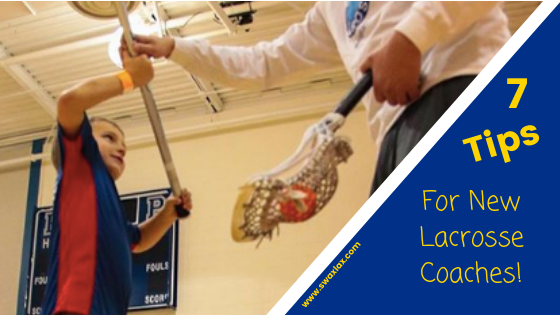7 Tips for New Lacrosse Coaches

It’s that time of year again. Time to get ready for lacrosse season. Practice may even have started for some of you. For you new lacrosse coaches, don’t panic. No matter what your background, you know more than your team does — even if you don’t think you do. Here are seven tips I like to give new coaches.
1. Have a plan
I recommend that your plan be inversely proportional to your coaching experience. The longer you have coached the less detailed your plan can be. If you are a brand-new coach, write out your practice plans to the minute. Identify what equipment you need for each drill. Sketch a diagram of each drill.
You should also have a plan for the season as well as each practice. I like to start by writing down all the skills, concepts, and plays that I expect my team to learn over the course of the season. Then add the dates you expect to have those skills, concepts, and plays installed by. This will make practice planning much more manageable.
Notice I said coaching experience; I did not say lacrosse experience. Playing is not coaching. Don’t rely on just having played lacrosse.
2. Have a back-up plan
Good coaches are like good scouts — they are prepared. Sometimes the first plan doesn’t work. Have a couple of extra drills ready in case the drills you planned to run are not working. Most of the time a drill fails is because the coach did not set it up or explain it correctly. Rarely it’s the players’ fault.
Do not be afraid to stop a drill and re-explain how you want players to do the drill. Sometimes just explaining to your players why they are doing the drill can bring it all together. Even the youngest players want to know WHY. If you can’t get the drill going after one correction, move onto something new. It’s not like they know everything. Even if some of them think they do.
3. Have an emergency plan
Most established programs have an emergency plan in place. Make sure you are familiar with it. If no one gives you one with the roster and the ball bucket, ask for one or make one of your own. Consider every contingency: From inclement weather, to a player whose ride doesn’t show up, to an injury requiring medical attention. This is not the time to be flying by the seat of your pants.
4. Do not be afraid to ask for help
Don’t try to reinvent the wheel. There is a lot of great information out there. Don’t be afraid to ask. Older coaches, such as I, love talking shop. We became old coaches because we love coaching and most of us love talking about it. It certainly wasn’t for the money or the complete lack of job security. Talk to someone already in your program or call your old coach. These guys have been through it already. They may be able to save you a few steps.
Don’t be afraid to go back with questions throughout the season. Mentoring is important at every stage of life. I’ve been coaching for 30 years, and I still love listening to how other coaches do things. Develop a coaching network.
If you are using older players to help out, make sure they know what you are trying to do. A short conversation before practice as you go over your schedule will prevent a lot of standing around and boredom. Give them specific responsibilities for every drill.
5. Be a positive role model
Kids are sponges. They will absorb everything they see and hear — and probably repeat it to their parents. Make sure you are a positive role model. This is much more important than teaching them how to do a split/roll combo dodge.
Be your best self. Besides the obvious no cursing, no drinking, and no smoking, try to demo skills the way you want your players to do them. If you want your guys shooting underhand or picking up ground balls with one hand, keep doing it yourself. If you want them shooting overhand bouncers and running through ground balls, do it yourself — every time you are on the field.
If your players hear you telling them to do something one way and see you doing it a different way, they get confused.
6. Reps are great, but good reps are better
Keep your practices high energy and don’t let drills go on for too long. If they haven’t gotten it right in 10 minutes, chances are they aren’t going to get today. Move on.
Keep the waiting in line to a minimum. If a player is waiting for more than 20–30 seconds before their next rep, they are probably going to get distracted and begin doing something they shouldn’t. Make short, simple corrections. Try to make specific corrections on the side before they get another rep. If the line gets too long, make another line. Two coaches are better than one. Try to get one coach to run the drill and another coach to make corrections.Lots of touches are better than lots of talking.
7. Have fun
Enjoy this. Chances are it isn’t going to make you rich but it can make you happy. Whether you decided to coach because you love lacrosse or you love your kid, remember why you are doing this. Find a way to make it fun for you and your team every day.
Someone, somewhere, sometime coached you. Inspired you. Made you better at something. You can be that inspiration for someone else just by sharing a little of yourself. The more you give the more you get.
About the Author
Kevin Meany is the head boys coach at Swax Lax Lacrosse. He was a goalie for Providence College, and when he’s not coaching for Swax Lax Lacrosse, he’s the assistant coach for the Morristown-Beard varsity and middle school lacrosse teams in Morristown, New Jersey, and a contributor to the Swax Lax team.

